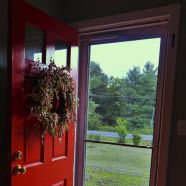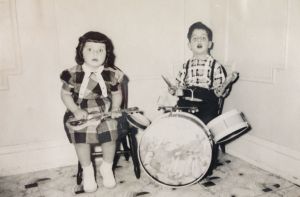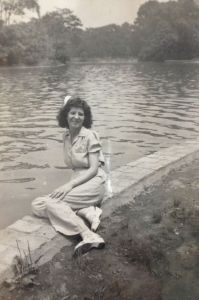
Wooden Front Door. Photo by Jo Zimny Photos. https://tinyurl.com/5awm8vje
Share This
Print This
Email This
Real Estate / Unreal Estate
Selling the House
Not a ghost, not a vision, there he was: my father at age sixty-nine, though he died at eighty, standing in the living room of my Durham house and looking around as he had the day we moved in. Saying, as he had more than twenty years earlier, “This is the kind of house you see in movies. The kind of house rich people live in. Congratulations, Marianna.”
Back then, my parents had driven with us to North Carolina to babysit our toddler while we closed on the house. Now, crossing from the foyer to the living room, I was filled with thoughts of family—moving in, births and birthdays, holidays when my parents had joined us. So, there he was: my father, who has been dead since the end of 1992. Not a ghost, not a vision, simply there but also not there—a memory as vivid as a hologram. A presence summoned up by my decision to sell the house, but being madly and irrationally reluctant to do so.
How do you sell a house when you have an instinct for places you’ve been happy, a variation on what Italians call the sta casa gene? Furtively, and with considerable angst that will lead, I learn over time, to a peculiar desire to possess, all at once, all the places I have ever lived. Rich in metaphor, fraught with meaning, what does it mean, finally, to sell the house?
My house—soon not to be my house—is a beauty. It has a gracious flow, lots of light, and, what counts most I think, an abundance of happy memories. My older daughter was an adorable fourteen months when we moved in: all chubby wobbly legs and dark brown curls, cascading around the place with her favorite bottle of apple juice in hand. My younger daughter was born slightly more than a year later, during a Guggenheim fellowship year, when I also finished a book. It was a productive time for me. I went from being an assistant to a full professor in that house, from being a published but still uncertain author to achieving what felt like my own voice. Over time, whenever we had the cash, we lovingly furnished or renovated almost every inch. The house felt lucky and collected happy memories. It was celebratory, with food almost sacramental. Selling it was a confession, always triste, of how much life had changed. For if the house had symbolized arrival, personally and professionally, giving it up signaled a possible decline that felt premature. It was “downsizing”—a dreary metaphor that cloaks with a smiley face the shrinking of late middle and old age.
The night we told our daughters the house was going on the market, my younger daughter tried to be stoic but then broke down on the phone. She wouldn’t be able to show the house to her own children, she said; she would never, ever see us all together in a place she had first seen with a toddler’s eyes. No deck would ever seem so special; the wallpaper in the bathroom would never be so dazzling; the cardinals in the trees wouldn’t seem, somehow, as red. The past would be lost and no amount of searching would ever bring it back. All true. The past had been a thing of richness and plentitude and I was not eager to shed it. I told her, and myself, that history and memories do not reside in any meaningful way in a house. They reside in people and in us. But was I lying? Or at least not yet telling the whole truth?
Unreal Estate
“Unreal estate” refers to the memory of people who are gone, places that have vanished from our lives, the past itself. It’s Vladimir Nabokov’s supple phrase in his classic autobiography, Speak Memory. Regardless of age, we all have unreal estate that becomes a bigger part of our portfolios all the time. There’s no mortgage on unreal estate, no possible bubble, except for the delusions caused by the past. Only limited renovations are ever needed, or even possible though, as with regular real estate, maintenance remains ongoing.
As my recent memoir Crossing Back drew to its close, the daily meditation practice it describes surfaced saturated moments out of time: vivid memories about the beloved dead. The memories advanced the goal of the book: to access shards of memory, without pain.
The memory of my father came to me in a flash, with the vivid tangibility of unreal estate. I was seven or eight at the time and we were, as we were many weekends, at my cousin Nick’s house in Islip, which was then a rural and little-known Long Island town on the southern shore, where we’d lower crab traps from the local piers. My Uncle Joe would drive us, slowly, as was his wont, in his sturdy black Ford that looked like something out of a 1930s movie, guided at each turn by my Aunt Minnie, his much-needed navigator. I resemble Minnie physically, though not as much as I resemble my mother. I can still see her round face and thin, curly hair, dyed red as she grew older, her cheerful yet also somehow dour face, behind clear-framed glasses, and her slightly pinched mouth, which could say things that were wry and funny or bad tempered.
Nick’s house was fairly simple—a bungalow really, with a yard, and a rose garden I loved. At night, we’d light a fire in a trash can—an odd hobo’s habit in a stable family. We’d play cards or sing the kind of nonsensical and often somewhat vulgar songs that are part of Italian American tradition, which abounds in puns and innuendos. If you’ve seen the wedding scene in Coppola’s The Godfather or heard a CD called Mob Hits, you know the kind of thing I mean: “Get outta here with your boom-boom-boom [just a sound here, accompanied by a rude arm gesture] and don’t come back no more!” What was a “boom-boom-boom?” I’d wonder.
The back of the house faced an open field that was used to train race horses, with a circular track and then a heavily treed road paved in gravel that led to a highway. One Sunday, my father and I sat for a lazy afternoon making kites out of newspaper comics. I remember picking and choosing which pages would show on my kite and which would be glued and hidden. My father chose his own, with a flourish. I remember feeling like it was a miracle to see kites take shape out of some sticks, newspaper, tape, and glue. Late that day, toward sunset, the glue was dry, the wind picked up, and the kites took flight. We ran along the yard and along the track and the kites looked wonderful against the deep blue summer sky. Then, for reasons I don’t recall—maybe bravado, maybe just a desire for a change of scene—we started up the gravel road that led to the paved road. We ran here too and the kites kept pace, flying up high against the darkening blue. Until, as we were about to enter the main road, my kite caught on a telephone wire near a tree.
I can still see my father running down the road—tall, lanky, his tongue protruding between his teeth, as often happened when he was concentrating. I can feel the fresh air, the waning sunshine, and the slight cooling of the coming evening sky. I can recall the effort Dad put into retrieving that kite—shimmying up the tree and using various sticks and branches. But it was just out of reach and would not budge. He offered me his kite but, as any child will know, that wouldn’t and couldn’t be the same. We walked back down the road, his arm around my shoulders. And he said, in the boisterous voice I always considered, somehow, faux boisterous: “Well, but we had fun, anyway, didn’t we?” I don’t know whether I agreed at the time. But I sure do now. We had fun. I wonder, if he were selecting a memory, a bit of unreal estate, what he’d choose.
The memory of my mother is more vexed and awkward. It’s not filled, or not at first glance, with the joy of the outdoors or flying a kite. I find it odd, but telling, that I recalled this incident most of all. Unlike the memory of my father, it’s not tied not to a house but to a vividly remembered classroom.
Unlike many of the mothers in my elementary school class, my mother worked and so was not available for field trips or parties or for many of the other things mothers do. One day, the class was scheduled to listen to a radio broadcast, from the UN. Listening to the radio in class was still a big thing back then, so the teacher announced that there would be refreshments, and that we should invite our mothers—fathers, it was understood, would be working.
As a garment worker, a finisher who checked buttons and snipped threads, my mother experienced seasonal layoffs when she’d routinely collect unemployment insurance and nominally (though not really) look for another job until things “picked up.” It was one of those seasons; she was waiting for things to “pick up.” I invited her to class and, when she said she’d come, invested some time and energy imagining what it would be like. She arrived on time, dressed in a suit, with a white blouse and gloves, and simple pumps. Her hair was short and curled and nice. She looked like a lady.
When the radio went on, I recall her holding her purse in her lap and straining to look attentive and interested though the broadcast—whatever it was, I’ve blanked it out—was so dull I felt mortified. The refreshments were meager and, what’s worse, no one else’s mother came, so that I could tell my mom felt uncomfortable.
I find it such an unpleasant bit of unreal estate, until a friend points out that I’m thinking from the point of view of an embarrassed child feeling bad about having put her mother in an awkward spot. In a different key, the scene reads as an act of love, different from my father with the kite, but typical of my mother, who showed her love indirectly. For if I invested effort in that day, as I did, my mother had too. She wore white gloves and was careful to look nice. She was showing love through things, as she often did—good food, new clothes—like the time she’d splurged, and I knew it, to buy me an extra dress at A&S in downtown Brooklyn, an A-line short sleeved number in kelly green that I still remember vividly. The memory of my mother in her suit and of that kelly-green dress remain part of my unreal estate.
In my meditations, a memory of my own childhood became a proxy memory that my son Matthew, who died as an infant, never got to have or, at least, to express. The memory resonates with Virginia Woolf’s The Waves, a novel I have written about, in which each character has a shattering moment in early childhood, discovering that a boundary exists between the self and the outside world. I was young, perhaps three or four, and once again in the yard at my cousin’s house in Islip. It was early morning or just getting dark—one or the other, I remember only that the light was striking and unusual. I’ve always loved to make up stories, and I was singing and talking to a rose bush. I suspect that I was telling this bush some favorite story, not yet making the kind of distinctions an older child would between people and things, inside and outside. My Aunt Minnie came looking for me and, seeing and hearing what I was up to, called out loudly, “Hey. Rose. She’s out here and the kid is talking to a rose bush!” She might have thought it was cute; she might have thought it was weird—my Aunt Minnie could have gone either way. But the effect for me was like the scene in a Woody Allen movie when the Woody character, as an awkward teen, purchases porn magazines, adding numerous other items he can’t afford to make the purchase less noticeable, and the store clerk calls out, in a loud voice so that everyone in the store can hear, “Hey Moe, how much is Screw magazine?” Even as a child, I felt mortified.
Matthew taught me a lot—not all of it happy by any means. But I remember discovering by observing him, far more effectively than by reading Lacan, why so many people marry those who resemble them, often in the configuration of eyes and nose.
My son was two, maybe three months old, not far away from his premature ending, and dressed in an adorable outfit in kelly green. (Kelly green: family history and unreal estate work through uncanny repetitions; so does reality.) He was on a dressing table where it was secure to leave him for a few minutes. When I turned back, he was touching his face in the mirror and smiling, cooing, clearly having fallen in love with his own image. “Who’s that?” he would have said, had there been words. “You’re pretty great and I love you!” He didn’t process the image as himself at all—any more than a cat does when you hold it up to a mirror. He was floating—as was I with the rose bush—in moments that come often for children and still happen from time to time throughout life, when we feel at one with the universe and in love with everything around us, including that good-looking person in the mirror there. Real estate. Unreal estate.
Coda
“Welcome home!” my meditation teacher says when I’ve been gone from class for a while—and to all of us when we come out of meditation. Is he, as he says, a little strange, having meditated for more than fifty years? Is he just being warm and nice? Or does he sense something that he’s acknowledged from time to time in compliments about the steadiness of my breath and smooth facial expression. “Quiet” he called me once in a private session I booked to ask permission to quote him in my writing, which he freely gave. Quiet: which I’m not. Until I realized that I really am quiet in his studio, rarely needing and never demanding his attention before or after class, as many people do.
In recent years, meditation has become a vogue and a fad, nurtured, among other things, by the success of Elizabeth Gilbert’s Eat, Pray, Love. The worst scenes in the movie version show Julia Roberts sitting with her legs crossed and her hands in gian mudra (palms up, thumb touching the index finger)—a pose we are supposed to read as “acquiring tranquility and wisdom.” The shots are annoying. Except that people really do acquire more tranquility and wisdom in meditation, if they stick with it—or, at least, more tranquility. Meditation has been practiced for centuries, in the East and West—extended prayer and chanting being forms of meditation too. Science has caught up to what yogis have known for centuries: meditation slows the breath and calms the mind and even, over time, changes it. Most of all, meditation gives a different feeling for what is, and is not, important.
“If it works, use it!” Al says cheerfully to most of the questions people ask him about meditation. He doesn’t care how many beats we hold our breath or the precise way we hold our fingers. He doesn’t care whether we do perfect down dogs or planks. “It doesn’t matter,” he told me in that private session, “we’re all going to die anyway.” Working quickly, Al tries and mostly succeeds in generating a feeling of transcendence, in Manhattan, in sixty minutes. It is a compromise, he knows—what he calls a taste of samadhi.
This teacher’s constant good humor proves infectious—it’s his “job” he says, and it gives him now, into his seventies, a childlike air. “You should know where you are going after death,” Al says sometimes at meditation, laughing jovially. “We can love life and should! Enjoy it! It’s good! But we can’t stop time. We’re all going to die. Mahasamadhi, the big game, Super Bowl Sunday!” It’s a joke, comparing the moment of death to America’s football feast day—a joke of the kind Al almost always makes when he introduces death. It’s his way of reaching the twenty-somethings who flock to his meditations, without scaring them off. But he’s utterly serious about Mahasamadhi as the ultimate state of samadhi.
The Tibetan Book of the Dead says that a good death recognizes and follows energy pathways out of the body. Meditation helps prepare you for that. In meditation, you clear a space in your mind and surrender to find those pathways as a preparation not just for life but also for death. You make your mind an empty space, stripped and bare, but still well lit and recognizably lovely. The absence of you, in the body, is the final meaning of selling the house. You survive in memories and in the ghost light of your energy. But the stage is stripped, the screen ready for the next movie.
When you come out of meditation, slowly re-grounding the body, and go back to everyday things—the going back being absolutely essential—your body feels relaxed, your mind clear, your back unknotted, fluid, and “green at the spine.” Welcome home.









❤️
How lovely! Thank you, Marianna. I remember your beautiful house from a seminar with you. I wish you many more happy memories wherever you have landed by now.